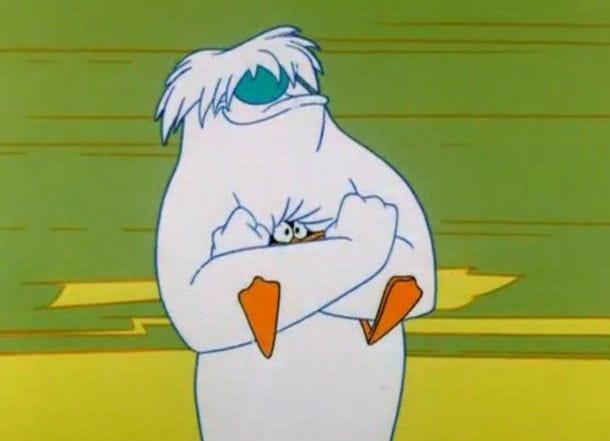Of Mice and Men (1937) appeared in middle of the Dust Bowl years and the Great Depression. It contains themes Steinbeck would develop more fully in some of his later work: The powerlessness of farm workers, the omnipresence of nature in the lives of humans, and the ignis fatuus of the American dream. One of the bleakest, most tragic stories ever written, it often gets challenged because of its profanity, racial slurs, violence, and depressing themes. Of course, farm workers in the mid-1930s actually used profanity and racial slurs, frequently faced violence, and, let’s face it, lived in a pretty depressing time.
George and Lennie arrive at a farm as manual laborers to help load and transport harvested barley. Lennie has mental challenges—he can’t remember much, or follow any but the simplest chains of reasoning—but he also has the friendly and trusting disposition of a child. Unfortunately, Lennie also has the strength of two or three men and not much control over that strength. George looks after Lennie as the two travel from one farm to another. Apparently, they can’t stay in one place long enough to save up anything, because Lennie inevitably does something unintentionally that forces them to leave. The greatest source of trouble for Lennie comes from his fascination with soft and pretty things, like rabbits, mice, or puppies. He likes to hold them and pet them, but since he doesn’t know his own strength he invariably ends up killing them. From the very beginning, when George takes a dead mouse from Lennie and throws it away, we know that something or someone will get hurt.
It doesn’t take long for trouble to show up in the form of Curley, the owner’s son. He has a reputation as a lightweight boxer, and from the very first we know he wants to pick a fight with the new hands. As the owner’s son, he’ll never get fired, and he knows it. He knows he can push the hired men around as much as he wants. One of them explains to George after his first encounter with Curley:
“Never did seem right to me. S’pose Curley jumps a big guy an’ licks him. Ever’body says what a game guy Curley is. And s’pose he does the same thing and gets licked. Then ever’body says the big guy oughtta pick somebody his own size, and maybe they gang up on the big guy. Never did seem right to me. Seems like Curley ain’t givin’ nobody a chance.”
If you add the fact that Curley has just gotten married a couple of weeks before, and his new wife already has her eyes on the men, we pretty much know how things will turn out. Steinbeck really brings home the power dynamics between farmers and the hired workers. The latter know their own vulnerability quite well. They can’t stand up for themselves or for each other, because they desperately need to avoid trouble. The landowner himself just wants to get the work done, and can even show some generosity at times. Curley and his wife, however, see the workers as playthings rather than people, and they clearly enjoy preying on the defenselessness of those without power.
Steinbeck creates suspense through a film-like presentation instead of through eavesdropping on people’s thoughts. Much like a movie that introduces a dangerous threat early on, Steinbeck builds tension through Lennie’s potential for accidental violence. Unlike in a suspense movie, though, where we identify with a helpless protagonist, in this story, we worry, not about George, but about everyone else in the room. When George has stepped away for a moment, even the most rambling, harmless conversation with Lennie can feel as though a time bomb ticks away in the background.
In case Lennie sounds familiar, we have seen the character of the big-hearted, dim-witted giant parodied in many cartoons. You may recall the abominable snowman from Looney Tunes, “I will hug him, and squeeze him, and call him George.”
George laments the fact that he can never win. As soon as things start to look good, Lennie ruins everything. As Crooks, a black farmhand, points out, for everyone who has ever worked there, something—gambling, drinking, whoring, something—always ruins their hopes. Something always intervenes to beat them down the moment a ray of hope enters their lives. For George, this something doesn’t come as a personal vice, but rather as a giant shadow following him everywhere: the big guy who adores him.
This novella, though quite simple, carries a powerful emotional punch. By adopting the standpoint of a movie camera, the narrative limits us to what we can see or hear. We never overhear the thoughts of any character. Sometimes, behavior alone reveals inner suffering, particularly when the only possible emotion needs no explanation. Then, a bleak, expressionless face can prove gut-wrenching for the reader.
Lennie can’t think very well, but he can feel. He often feels how much trouble he causes George, and offers more than once to go away and live in a cave. Of course George knows that Lennie wouldn’t have enough sense to feed himself. Their relationship goes back to childhood. As a child, George often played mean tricks on Lennie, and Lennie didn’t have the smarts to even realize it. One time, George told him to jump in a lake. Lennie did, obediently, but he couldn’t swim. When Lennie almost drowned, George had an awakening and realized that no one else would take care of Lennie if George didn’t. From then on, he guarded Lennie like a parent. But he often despaired because staying together doomed them to always flee from one migrant job to another.
Lennie had trouble remembering anything new, but he drew comfort from stories or narratives he had often heard. He begged George to tell him about the homestead they would buy together and “live offa the fatta the lan.” He listened gleefully and filled in the parts of the story when George paused. This and other stories delighted Lennie like a favorite bedtime story. At the very end of the novella, after Lennie has unwittingly killed Curley’s wife, he even pleads with George to yell at him like he always used to.
Lennie said, “George.”
“Yeah?”
“Ain’t you gonna give me hell?”
“Give ya hell?”
“Sure, like you always done before. Like, ‘If I di’n’t have you I’d take my fifty bucks——‘”
“Jesus Christ, Lennie! You can’t remember nothing that happens, but you remember ever’ word I say.”
“Well, ain’t you gonna say it?”
George shook himself. He said woodenly, “If I was alone I could live so easy.” His voice was monotonous, had no emphasis. “I could get a job an’ not have no mess.” He stopped.
“Go on,” said Lennie. “An’ when the enda the month come——“
“An’ when the end of the month come I could take my fifty bucks an’ go to a . . . . cat house . . . .” He stopped again.
Lennie looked eagerly at him. “Go on, George. Ain’t you gonna give me no more hell?”
“No,” said George.
I felt from start to finish the weight of a moral burden I could not escape. Lennie offers nothing rewarding for George. No ties of blood, law, or community bind them. But George cares for Lennie, maybe out of guilt or maybe out of simple humanity. That caring steals from George any hope of steady employment, long-term relationships, a family, a future. But he couldn’t just walk away, leaving Lennie to fend for himself. I felt the suffocation that such a burden brings with it. We have all, at one time or another, had to set aside our own plans and care for someone who depends on us in their helplessness. This novella puts the reader into a just such a bind, but with no morally acceptable escape. Of Mice and Men forces the reader to feel George’s moral bind, one in which the least desirable resolution becomes the only one: a merciful bullet to the back of the gentle and trusting head.
§ § §
I’ve never finished Jude the Obscure, even though I’ve started it several times. I always empathized too much, and I could never bear to see what ultimately became of Jude. So, since I have started down this path of attending to the experience of the fiction instead of its message, I figure I should start looking into the works whose experiences have always driven me away. So, next week, a Thomas Hardy classic.
Thank you for reading these reflections on great literature. I make them freely available and allow comments from everyone.






I realize now upon reading this that every television series of the 1950s and early 1960s was modeled on Steinbeck's story telling. We were raised on these kinds of stories and moral dilemmas. It's been awhile since I've watched television, but it seems that the role of television as educator of morals has seen its day.